Unit 10 I've had this bike for three years 重要知识点复习课件
文档属性
| 名称 | Unit 10 I've had this bike for three years 重要知识点复习课件 |

|
|
| 格式 | pptx | ||
| 文件大小 | 1.1MB | ||
| 资源类型 | 试卷 | ||
| 版本资源 | 人教新目标(Go for it)版 | ||
| 科目 | 英语 | ||
| 更新时间 | 2022-07-07 00:00:00 | ||
图片预览

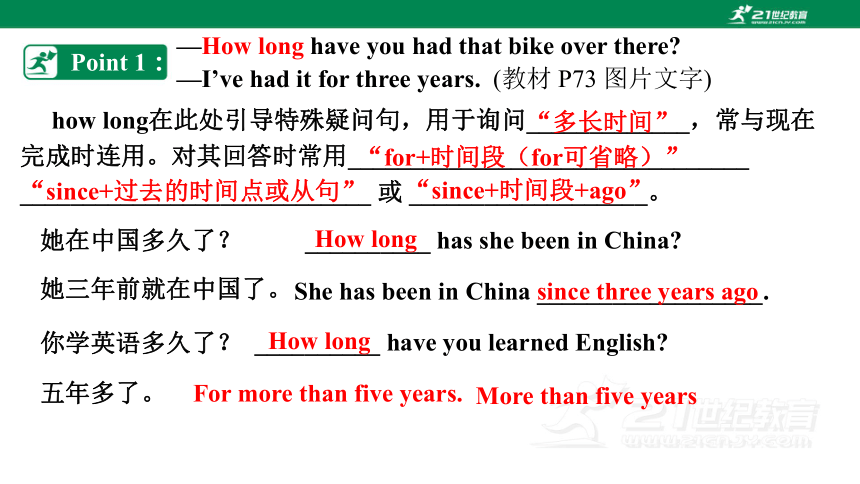
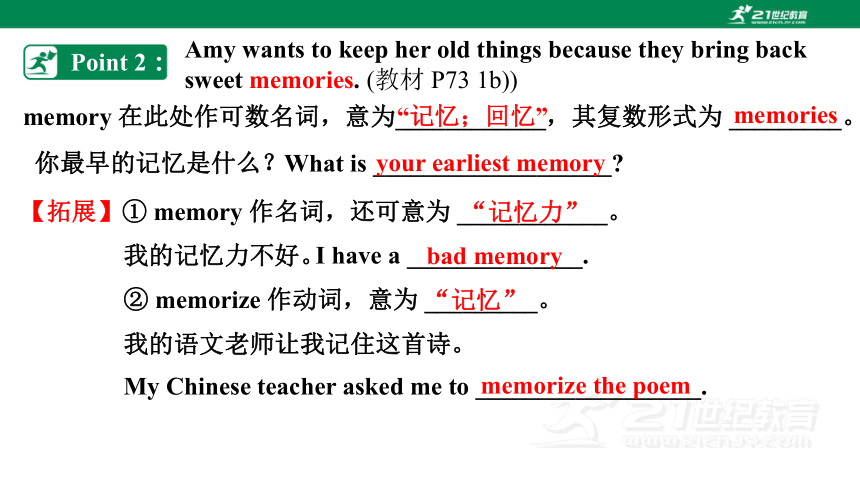
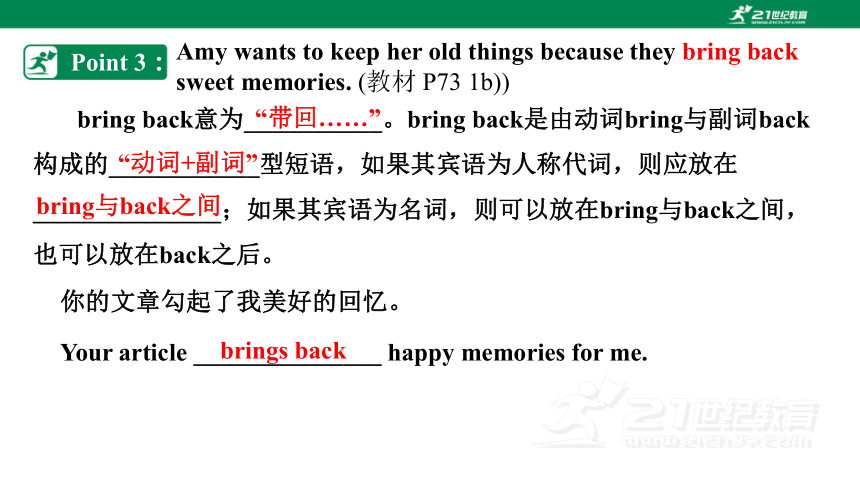
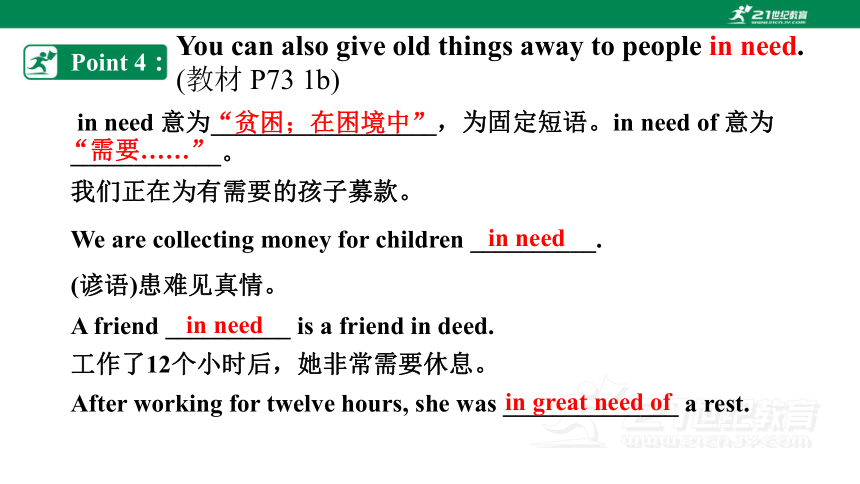
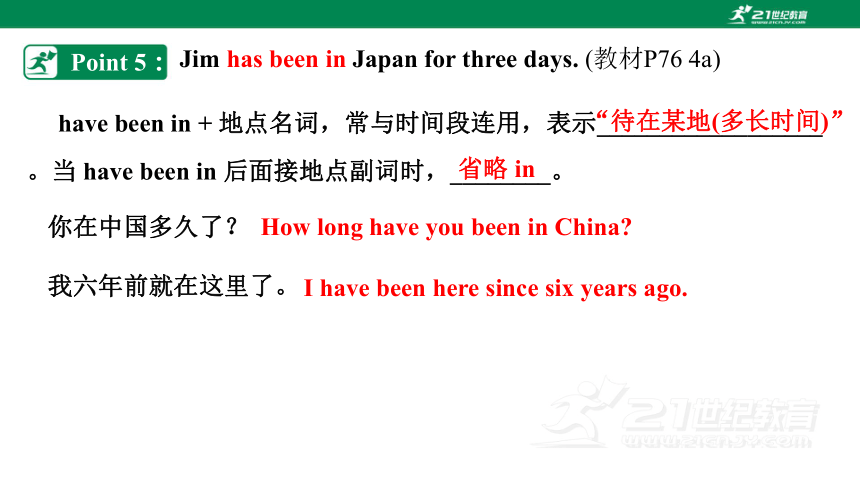
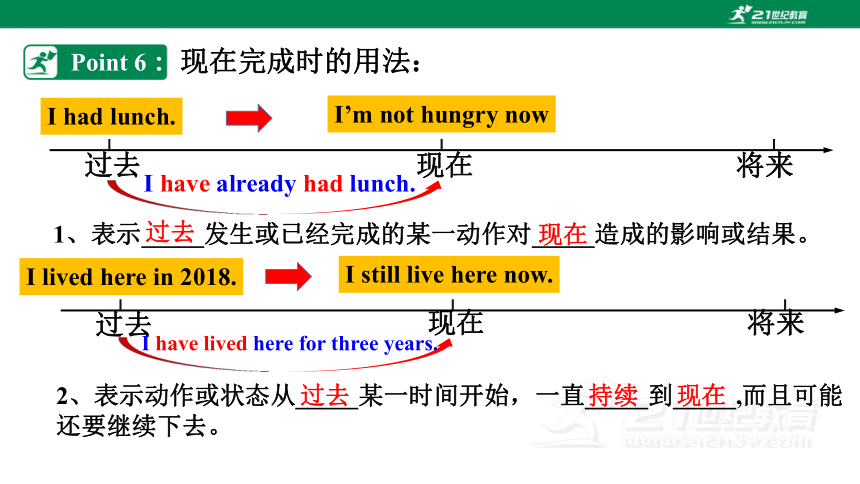
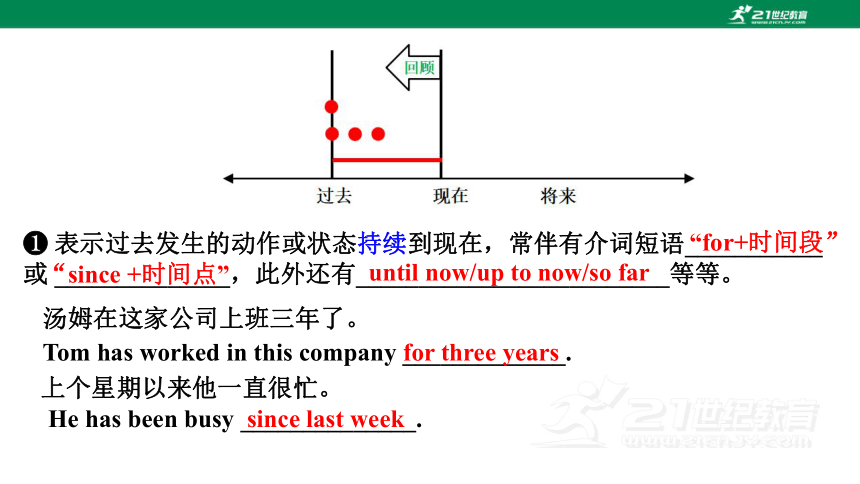
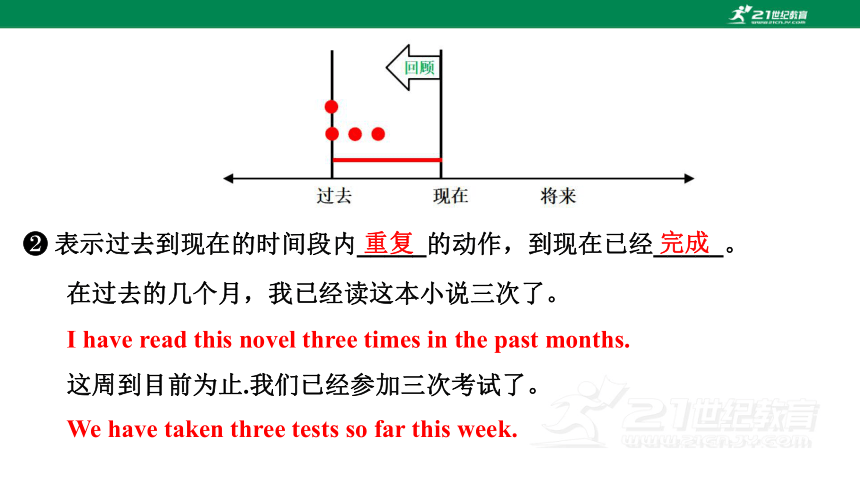
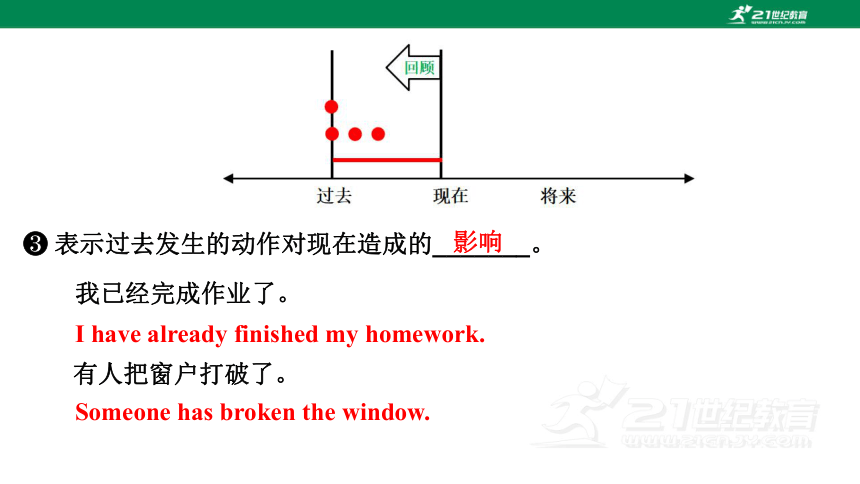
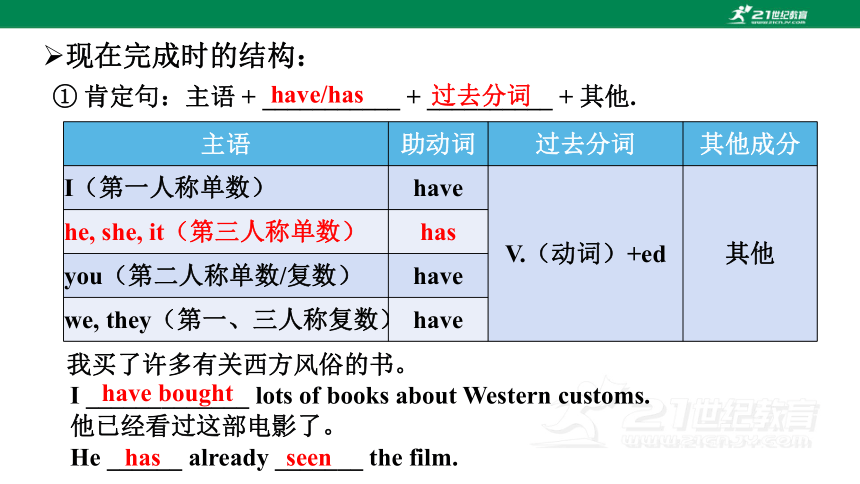
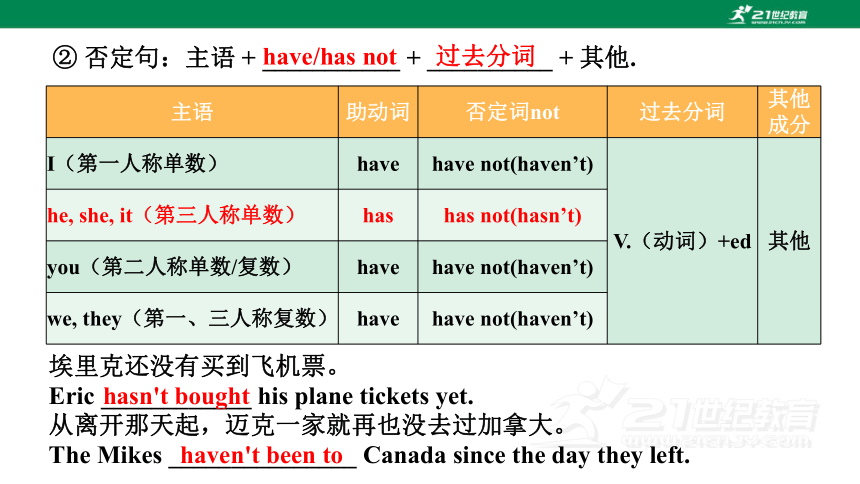
文档简介
(共52张PPT)
Unit 10 I’ve had this bike for three years.
重要知识点复习课件
人教版八年级下册
Point 1:
—How long have you had that bike over there
—I’ve had it for three years. (教材 P73 图片文字)
how long在此处引导特殊疑问句,用于询问_____________,常与现在完成时连用。对其回答时常用________________________________ ____________________________ 或 ___________________。
“多长时间”
“for+时间段(for可省略)”
“since+过去的时间点或从句”
“since+时间段+ago”
她在中国多久了?
她三年前就在中国了。
你学英语多久了?
五年多了。
__________ has she been in China
She has been in China __________________.
__________ have you learned English
For more than five years.
How long
since three years ago
How long
More than five years
Point 2:
Amy wants to keep her old things because they bring back sweet memories. (教材 P73 1b))
memory 在此处作可数名词,意为____________,其复数形式为 _________。
“记忆;回忆”
你最早的记忆是什么?
What is ___________________
【拓展】① memory 作名词,还可意为 ____________。
我的记忆力不好。
I have a ______________.
② memorize 作动词,意为 _________。
我的语文老师让我记住这首诗。
My Chinese teacher asked me to __________________.
memories
your earliest memory
“记忆力”
bad memory
“记忆”
memorize the poem
Point 3:
Amy wants to keep her old things because they bring back sweet memories. (教材 P73 1b))
bring back意为___________。bring back是由动词bring与副词back构成的____________型短语,如果其宾语为人称代词,则应放在_______________;如果其宾语为名词,则可以放在bring与back之间,也可以放在back之后。
你的文章勾起了我美好的回忆。
Your article _______________ happy memories for me.
“带回……”
“动词+副词”
bring与back之间
brings back
Point 4:
You can also give old things away to people in need. (教材 P73 1b)
in need 意为__________________,为固定短语。in need of 意为____________。
我们正在为有需要的孩子募款。
We are collecting money for children __________.
(谚语)患难见真情。
A friend __________ is a friend in deed.
工作了12个小时后,她非常需要休息。
After working for twelve hours, she was ______________ a rest.
in need
“贫困;在困境中”
“需要……”
in great need of
in need
Jim has been in Japan for three days. (教材P76 4a)
have been in + 地点名词,常与时间段连用,表示__________________。当 have been in 后面接地点副词时,________。
你在中国多久了?
我六年前就在这里了。
How long have you been in China
I have been here since six years ago.
“待在某地(多长时间)”
省略 in
Point 5:
现在完成时的用法:
过去
现在
将来
I had lunch.
I’m not hungry now
I have already had lunch.
1、表示_____发生或已经完成的某一动作对_____造成的影响或结果。
过去
现在
2、表示动作或状态从_____某一时间开始,一直_____到_____,而且可能还要继续下去。
过去
现在
将来
I lived here in 2018.
I still live here now.
I have lived here for three years.
过去
现在
持续
Point 6:
表示过去发生的动作或状态持续到现在,常伴有介词短语___________ 或 ______________,此外还有_________________________等等。
“for+时间段”
“since +时间点”
until now/up to now/so far
汤姆在这家公司上班三年了。
Tom has worked in this company _____________.
上个星期以来他一直很忙。
He has been busy ______________.
for three years
since last week
表示过去到现在的时间段内_____的动作,到现在已经_____。
重复
在过去的几个月,我已经读这本小说三次了。
I have read this novel three times in the past months.
这周到目前为止.我们已经参加三次考试了。
We have taken three tests so far this week.
完成
表示过去发生的动作对现在造成的_______。
我已经完成作业了。
I have already finished my homework.
有人把窗户打破了。
Someone has broken the window.
影响
① 肯定句:主语 + ___________ + __________ + 其他.
现在完成时的结构:
have/has
过去分词
主语 助动词 过去分词 其他成分
I(第一人称单数) have V.(动词)+ed 其他
he, she, it(第三人称单数) has you(第二人称单数/复数) have we, they(第一、三人称复数) have 我买了许多有关西方风俗的书。
I _____________ lots of books about Western customs.
他已经看过这部电影了。
He ______ already _______ the film.
have bought
has seen
② 否定句:主语 + ___________ + __________ + 其他.
have/has not
过去分词
主语 助动词 否定词not 过去分词 其他成分
I(第一人称单数) have have not(haven’t) V.(动词)+ed 其他
he, she, it(第三人称单数) has has not(hasn’t) you(第二人称单数/复数) have have not(haven’t) we, they(第一、三人称复数) have have not(haven’t) 埃里克还没有买到飞机票。
Eric ____________ his plane tickets yet.
从离开那天起,迈克一家就再也没去过加拿大。
The Mikes _______________ Canada since the day they left.
hasn't bought
haven't been to
③ 一般疑问句:_________ + 主语 + _________ + 其他
否定回答:_________, 主语 + ______________.
肯定回答:_________, 主语 + ___________.
Have/Has
Yes
have/has
haven’t/hasn’t
过去分词
No
have not=haven’t
has not=hasn’t
你读过《西游记》吗?
是的,我已经看了。
不,我还没看过。
_______ you ________ Journey to the West
Have read
Yes, I have.
No, I haven't.
她在这里住了两年了吗?
_______ she _________ here for 2 years
是的,他住两年了。
Yes, she has.
不,他没有住两年
No, she hasn't.
Has lived
③ 特殊疑问句:特殊疑问词+_________ + 主语 + _________ + 其他
have/has
过去分词
你到这儿多久了?
_______________ have you been here
你去过长城几次?
_____________________ have you been to the Great Wall
你读过哪本书?
_______________ have you read
How long
How many times
Which book
过去分词变化形式
(直 去 双 改 特)
过去分词与动词过去式变法规则基本一样。
变化规则 例词 一般情况下____________ work worked
jump jumped
look looked
以不发音字母e结尾的动词,___________ like liked
live lived
use used
以重读闭音节结尾且末尾只有一个辅音字母的动词,____________________________ stop stopped
plan planned
shop shopped
以辅音字母加“y”结尾的动词,要先____________,再加-ed,以元音字母加“y”结尾的动词,直接加-ed study studied
carry carried
play played
直接加-ed
去e加ed
双写该辅音字母后再加-ed
改“y”为“i”
过去分词不规则变化
(特)
现在式 过去式 过去分词 现在式 过去式 过去分词
be have
read [ri d] see
eat fight
fall feel
find fly
forget get
give go
hit hurt
know lead
was/were
been
had
had
read[red]
read[red]
saw
seen
ate
eaten
fought
fought
fell
fallen
felt
felt
found
found
flew
flown
forgot
forgotten
got
got
gave
given
gone
went
hit
hit
hurt
hurt
knew
known
led
led
现在式 过去式 过去分词 现在式 过去式 过去分词
leave hear
keep write
learn shoot
sit sing
sleep speak
spend stand
sweep swim
take teach
tell think
throw understand
wear win
left
left
heard
heard
kept
kept
learnt
learnt
shot
shot
sat
sat
sang
sung
slept
slept
spoke
spoken
spent
spent
stood
stood
swept
swept
swam
swum
took
taken
taught
taught
told
told
thought
thought
threw
thrown
understood
understood
wore
worn
won
won
wrote
written
3. ABA格式(动词原形与过去分词同形)
run→ran→run
come→came→come
become→became→become
4. ABC格式(动词原形、过去式、过去分词均不同形)
bear→bore→born
break→broke→broken
grow→grew→grown
5. AAB格式(动词原形与过去式同形)
beat→beat→beaten
1. AAA格式(动词原形、过去式、过去分词同形)
let→let→ let
put→put→put
read→read→read
2. ABB格式(过去式与过去分词同形)
feel→felt→felt
keep→kept→kept
sleep→slept→slept
不规则变化需要总结
现在完成时标志词
现在完成时不能和表示_______________连用,如:yesterday,last year,in 1980,three days ago,just now,when I came in等。现在完成时标志词有:already_______,ever_______,just_______,so far _______,yet__________,before_________,for+时间段___________,since+加时间点/一个过去式的句子____________________。
过去的时间状语
“已经”
“曾经”
“刚刚”
“至今”
“已经、还”
“…之久”
“自从…(到现在)”
“以前”
1、already_______,常用于________中,通常放在_______________,也可放________。
“已经”
肯定句
动词过去分词前
句末
我已经读过这本故事书了。
我已经洗了衣服。
I have ________ read this storybook.
I’ve washed my clothes _________.
already
already
表示吃惊等感彩时, already也可用于____________(口语)
疑问句
你(真的)已经见过他了
Have you met him _______
already
2、yet用在_______中意为______,用在______中意为______,放在______。
疑问句
“已经”
否定句
“还”
句尾
他已经找到他的手表了吗?
不,还没有。
Has he found his watch _____
No, not _____.
那位妇女还没有找到她的狗。
The woman hasn’t found her dog _____.
yet
yet
yet
3、just意为________,放在_________________。而just now__________,放在________,且代表___________________。
“刚刚”
动词过去分词之前
“刚刚”
句尾
“一般过去时”
他刚从学校回来。
He has _____ come back from school.
我刚刚完成我的家庭作业。
I finished my homework ________.
just
just now
4、so far意为________________________, 意义和用法相同的还有___________,___________放在___________。
“倒现在为止;迄今为止”
up to now
up till now
句首或句尾
到现在为止,我已乘火车旅行三次了。
I have travelled by train three times ________.
________, I have travelled by train three times.
so far
So far
5、ever意为_______,放在_________________。
“曾经”
动词的过去分词之前
你曾去过北京吗?
Have you _____ been to Beijing
我未曾和她说过话。
I haven't ______ spoken to her.
ever
ever
6、before意为_______,指过去不确定的某个时间,总是放在______,
“以前”
句末
你以前去过上海吗?
Have you been to Shanghai ________
我以前没吃过四川菜。
I haven’t eaten Sichuan food ________.
before
before
7、since意为______________,后面要跟______,或_________________,用于过去完成时。
“自从…(到现在)”
时间点
一个过去式的句子
8、for 意为_____________,后面要跟________,用于过去完成时。
“……之久”
时间段
________ 1984 ________ yesterday
________ about two days ________ two years
________ I was 10 for about two days ________ 10 years ago
________ threyears ago ________ over twenty years
________ she was a little girl ________ 10 years ago
He has been away ________ last week. ________ one week
since
for
since
since
since
since
since
since
since
for
for
for
口诀记忆: 句尾:since,for,yet
动前:ever,just
动前句尾:already
so far 前后,before后,
现在完成已看透。
________ 5 years ________ last Monday
________ you came here ________ a long time
________ 2018 ________ his 7th birthday
________ 2 days ________ 2 days ago
for
for
since
for
since
since
since
since
现在完成时与一般过去时的区别一
现在
过去
将来
比较:1. A: What did you do last weekend
B: I saw a new movie.
2. A: Would you like to see the movie with me
B: Thanks for your inviting, but I have seen it already.
总结 一般过去时 现在完成时
1.用法不同
(只谈论上周末做的事情,不涉及现在)
(影响:因为已经看过了,所以现在不去看了)
只表示过去的动作或状态
(不涉及现在)
表示过去发生的事情对现在造成的影响或结果
(与现在有联系)
现在完成时与一般过去时的区别二
比较:1. Tom ___________ (sweep) the floor yesterday.
2. My family ___________ (go) to Beijing last year.
3. I ___________ (can ) ride a bike when I was 6 years old.
4. I ________________ (not finish) my homework yet.
5. He ___________ (work) in the city for eight years.
6.判断正误: I have visited my grandparents yesterday.
He has finished his work two days ago.
(注:现在完成时的不能与表示过去的时间状语连用)
swept
went
could
haven’t finished
has worked
总结 一般过去时 现在完成时
2.时间状语不同
already, yet, just, ever, never, so far, for+时间段,since+时间点\从句...
yesterday, last week, ...ago, in 1995,in the past, just now, when...
have/has been to 与 have/has gone to 的区别
have/has been to 表示_________________,暗指现在_____________。后可接次数,如 once, twice, three times 等,表示_________________,也可和 just,never,ever等连用。 我姐姐去过大连两次。
你曾经去过西湖吗
have/has gone to 表示______________,暗含说话时该_____________。 吉姆在哪里
他去英国了。
“曾经去过某地”
“去过某地几次”
“去某地了”
已不在那里了
人不在现场
My sister has been to Dalian twice.
Have you ever been to the West Lake
Where is Jim
He has gone to England.
英语中,按动词延续的时间长短,可将动词分为_____________和____________。延续性动词,如:____________,______________,____________等。短暂性动词,即动作______________的动词,如:_________,__________,___________,__________,__________。延续性动词,就是可以______________________,只要你不累。短暂性动词就是________的事情。
当句子中出现____________,___________,___________________,___________等,这些表示一段时间状语的时候,不能使用短暂性动词,要使用延续性动词。用于现在完成时。
延续性动词与非延续性动词
延续性动词
短暂性动词
learn“学习”
work“工作”
play“玩耍”
一开始便结束
come“来”
go“去”
begin“幵始”
become“变成”
buy“购买”
想做多久就做多久的事情
一瞬间
“for+一段时间”
“since+从句”
“since+表示时间点的名词”
how long
(口诀:看见since,for,how long;廷续性动词不能忘)
他的祖父已经去世十年了。
His grandfather has died for ten years.
His grandfather has been dead for ten years
(×)
(√)
现在
过去
将来
我的兄弟自从五年前就在军队服役了。
My brother has joined the army since five years ago.
My brother has been in the army since five years ago.
(×)
(√)
非延续性动词与延续性动词之间的转换(常用)
put on穿上
meet遇见
borrow借来
buy买
join加入
catch/get+病得病
leave
come to/go to
reach/arrive in(at) 来,去,到达
wear穿着
know认识
keep持有
have拥有
be in在……里了
have+病有病
be away from 离开……了
be in/at 在……
die死
be dead死了的
start/begin开始
be on进行了
finish/end结束
be over结束了
open打开
be open (adj.) 开着的
close关闭
be closed (adj.)关着的
marry结婚
be married 已婚的
go back to / return to 返回
be back to回来了
go out出去
be out在外面了
become变成
be是
fall asleep/get to sleep 入睡
be asleep睡着的
Becky (has been, has become) a doctor for ten years. She likes her job very much.
2) We are late. The movie (has started, has been
on) for ten minutes.
3) Ken, you should return the book to the library. You______________
(have borrowed, have kept) it for more than two weeks.
4) I (have bought, have had) this bike since I was ten,
so I want to buy a new one.
has been
has been on
have kept
have had
练一练
练一练
下面是句子的同义句转换,将原句一般过去时改成现在完成时
1. He went to school two hours ago. (一般过去时)
get to/ arrive in ( at ) /reach+地点→be in+地点
He has been in school for two hours.
(现在完成时,将go to school变为be in school, for +时间段)
He has been in school since two hours ago.
(现在完成时,since跟过去的时间点)
2. I borrowed the book five days ago.(一般过去时)
borrow借(短暂) →keep保存(延续)
I have kept the book for five days.
I have kept the book since five days ago.
3. He bought the bike three years ago.
4. She fell asleep one hour ago.
5. My sister became a nurse one year ago.
He has had the bike for three years.
He has had the bike since three years ago.
She has been asleep for one hour.
She has been asleep since one hour ago.
My sister has been a nurse for one year.
My sister has been a nurse since one year ago.
buy买(短暂)→have拥有(延续)
fall asleep入睡(短暂)→be asleep睡着的(延续)
become变成(短暂)→be是(延续)
Point 7:
We have already cleared out a lot of things from our bedrooms. (教材P75 3a)
clear out 意为_______________,为____________型短语,代词作其宾语时要位于_______________。该短语中,clear 作动词,意为__________________。
“清理;丢掉”
“动词 + 副词”
clear 与 out 之间
“清理;清除”
我们扔掉了所有的旧衣服。
We __________ all our old clothes.
把桌子上所有那些文件都拿走。
_______ all those papers off the desk.
壁橱很脏,我们需要把它清理干净。
The closet is dirty, and we need to ___________.
轮到凯利收拾桌子了。
It is Kelly’s turn to ____________.
cleared out
Clear
clear it out
clear the table
Point 8:
We have decided to each sell five things that we no longer use. (教材P75 3a)
no longer 意为 _______,表示在__________________,强调时间。相当于 _______________。
no more 意为 _______,修饰终止性动词,表示在____________上“不再”继续,强调次数。相当于 ______________。
“不再”
时间上“不再”延续
not ... any longer
次数上或程度
not ... any more
这个词已经不再用了。
This word is ___________ in use.
This word is ___________________.
(改同义句)
no longer
not in use any longer
时光一去不复返。
Time lost will _________ return.
no more
Point 9:
For example, he has owned a train and railway set since his fourth birthday ... (教材P75 3a)
own 在此处作及物动词,相当于 have。own 的名词形式为______,意为_______________。
owner
“物主,主人”
这个小女孩是这本书的主人。她有许多种书。
The little girl is _____________________. She ______ many kinds of books.
【拓展】① own作形容词,意为_____________________________,常作定语修饰名词。
the owner of this book
owns
我亲眼所见。
“(用于强调)自己的;本人的”
I saw it ________________.
② own 作代词,常与one’s连用,意为“自己的东西;自己独有的东西”。on one’s own ___________, of one’s own___________
with my own eyes
单独;独自
属于自己的
你不能指望他一个人做这一切。
我想有一个属于自己的地方。
You can’t expect him to do it all __________.
I’d like to have a place __________.
on his own
of my own
Point 10:
My daughter was more understanding, although she also felt sad to part with certain toys. (教材P75 3a)
part 在此处作动词,意为_____________,part with 意为________________________________,为“动词 + 介词”构成的短语,其后常接___________作宾语。
“放弃、交出(尤指不舍得的东西)”
名词或代词
人群分开让他通过。
The crowd _______ to let him through.
他们对离开这所旧房子感到难过。
They felt sad to __________ the old house.
【拓展】 part 还可作名词,意为_______________。常用短语有:take part in ______, play a part in _________________________.
“离开;分开”
parted
part with
“角色;参与”
参加
在……中扮演角色/起作用
About 400 students _____________ the activity.
大约400名学生参加了活动。
地球上的每个人都应该参与清理工作。
Everyone on the earth should _____________ cleaning it up.
她在那部电影中扮演了一个角色。
She _____________ that movie.
took part in
play a part in
played a part in
Point 11:
My daughter was more understanding, although she also felt sad to part with certain toys. (教材P75 3a)
certain 作形容词,在此处意为____________________,通常用于名词前作定语。
昨天某个人打电话给我。
_______________ called me yesterday.
某些事情我应该和我母亲讨论
There are _____________ I should discuss with my mother.
A certain person
certain things
“某种;某事;某人”
【拓展】 certain 作形容词,还可表示__________________,与 sure 同义,此时常用作表语。be certain of/ about_______________。
“确信的,无疑的”
“对……有把握”
如果你想确定能买到票,现在就预订吧。
If you want to ____________ getting a ticket, book now.
我不确定什么时候能准备好。
______________ when it will be ready.
be certain of
I’m not certain
Point 12:
As for me, I did not want to give up my football shirts, but, to be honest, I have not played for a while now. (教材P75 3a)
to be honest 通常作插入语,其后常用____________________隔开。与 to be honest 意思相近的短语是 ____________________“老实说;说实话”。honest 作形容词,意为________________。
逗号与句子的其他部分
to tell (you) the truth
“诚实的;老实的”
老实说,他是一个诚实勤奋的男孩。
To be honest, he is ____________________________.
【拓展】honest 的相关词汇:honest adj. 诚实的;老实的→honestly adv.
诚实地;正直地→honesty n.诚实→dishonest adj.不诚实的
an honest and hard-working boy
Point 13:
As for me, I did not want to give up my football shirts, but, to be honest, I have not played for a while now. (教材P75 3a)
as for意为_____________,用于连接前面所谈论的内容,并转入一个新话题。as for后可跟名词、代词或v.-ing形式作宾语。既可放在句首,也可放在句中。
至于天气,明天将是晴朗的一天。
_________________, it will be a sunny day tomorrow.
你可以问其他人,但至于我自己,我在家会很忙。
You can ask the others, but _______________, I’ll be busy at home.
至于那个人,我对他一无所知。
_______________, I know nothing about him.
我非常喜欢英语。但至于数学,我不喜欢它。
I like English very much. But _______________ I don't like it.
As for the weather
as for myself
As for the man
as for math
“至于;关于”
Point 14:
As for me, I did not want to give up my football shirts, but, to be honest, I have not played for a while now. (教材P75 3a)
while 在此处用作名词,意为____________________,常用单数形式,与不定冠词 a 连用。常用搭配有:after a while _____________;for a while ______________; quite a while ______________; in a while ___________; all the while _____________;once in a while ____________
“一段时间;一会儿”
过了一会儿
暂时,一会儿
很长一段时间
不久,马上
一直;始终
偶尔;有时
最后,他可以放松一会儿。
At last, he could relax for a while.
托马斯先生一会儿就来接你。
Mr. Thomas will come to meet you in a while.
他偶尔来我们房间聊天。
He comes to our room for a chat once in a while.
【拓展】while 还可作从属连词,引导时间状语从句,意为_____________,作并列连词,意为______________,表示对比、转折
“当…的时候”
“而;然而”
当讨论还在进行时,乔治进来了。
______ the discussion was still going on, George came in.
While
东南部雨水充沛,而东北部雨水很少。
There’s plenty of rain in the southeast, _____ there’s little in the northeast.
while
Point 15:
It’s been around for at least 20 years. (教材P77 1d)
此处 around 作地点副词,表示“在附近;在某处”。
我告诉过你了。他不在附近。
I told you. He’s not around.
【拓展】around 作副词,还可意为 __________________________,作介词,意为___________________________等。
“大约,左右;四周;掉头”
“在……附近;围绕;到处”
这里大约有一百名学生。
There are ___________________________ here.
我们花了好几年的时间开着一辆旧车四处旅行。
We spent years ________________ in an old car.
她把车调头开走了。
She turned the car ________ and drove off.
拐角附近处有一家新电影院开业。
There is a new movie theater open _________________.
讨论围绕四个主题。
The discussion centered ____________________.
around one hundred students
travelling around
around
around the corner
around four subjects
Point 16:
Even though it’s old, it’s full of interesting places to see and things to do. (教材P77 1b)
① even though和even if两者均可用于引导____________,其细微区别是:even if引导的从句往往是假设性的,相当于汉语的_________ _________ _________ _________。even though引导的从句内容往往是真实的,主要用于引出不利于主句情况的信息,相当于汉语的_________ _________。 不过,在实际语言运用中,even if与even though有时也可不加区别地混用。
让步状语从句
“即使”
“纵然”
“就算”
“哪怕”
“尽管”
“虽然”
即使明天下雨,我们也决不改变计划。
________ it rains tomorrow, we won’t change our plan.
他尽管经验最少,但教得最好。
He’s the best teacher __________ he has the least experience.
尽管她嘲笑他,他还是很喜欢她。
____________________ she laughs at him, he likes her.
Even if
even though
Even if / Even though
Point 17:
Nowadays, millions of Chinese leave the countryside to search for work in the cities. (教材P78 2a)
① search在此处作动词,意为_____________。search ( + 地点) for sb./ sth. _____________________,search sb. __________。
他到处找他的书包。
He ____________ his schoolbag everywhere.
访客进入大楼时会定期接受搜查。
Visitors are regularly ____________ they enter the building.
“搜索;搜查”
(在某处)搜寻某人/某物
搜某人的身
searched for
searched as
② search 意为“搜索;搜查”时还可作_________。in search of 意为________________。
名词
“寻找……”
他们花了很长时间寻找失踪的孩子。
They made a long ___________ the missing child.
汤姆去大城市找一份好工作。
Tom went to the big city ___________ a good job.
search for
in search of
Point 18:
Among these is Zhong Wei, a 46-year-old husband and father. (教材P78 2a)
among 作介词,意为_______________________,用于三者或三者以上的情况,其常见用法如下:
“在(其)中;……之一”
① 用来引出最高级的比较范围。
The movie is the best ________________________.
这部电影是现代电影中最好的。
② 表示“……之一”,相当于“one of …”。
New York is _______________________________ in the world.
纽约是世界上最大的城市之一。
among the modern movies
among( = one of ) the largest cities
【易混辨析】among 与 between
among 在所有的学校科目中,我最喜欢英语。
____________________________,English is my favorite.
between 那张纸掉在桌子和墙壁之间(的缝隙里)了。
The paper fell down ___________________________.
用于三者或三者以上
指两者之间
Among all the school subjects
between the desk and the wall
【特别提醒】表示“三个或三个以上的人或物中的每两个之间”,应用 between,而不用 among。
她在两餐之间吃些药。
She takes some medicine ______________.
between meals
Point 19:
Many people like Zhong Wei regard with great interest how their hometowns have changed. (教材P78 2a)
① regard 在此处作动词,意为_________________________________。
She stood back and __________________.
她退后一步,冷冷地看着他。
② regard作动词时,还可意为__________________________________,regard…as…表示______________________。
他的作品受到艺术家的高度评价。
His work is highly _________ by artists.
我们一直认为红色是希望和好运的象征。
We always _____________ the symbol of hope and good luck.
“(尤指以某种方式)注视,凝视”
regarded him coldly
“将……认为;把……视为;看待”
“把……当作/视为……”
regarded
regard red as
Point 20:
According to Zhong Wei, however, some things will never change. (教材P78 2a)
according to意为_____________,其中to是_____,后可接______、______、______。
“依据;按照”
名词
代词
从句
介词
一切按照计划进行。
Everything went ________________.
根据他所说的话,那是一部了不起的电影。
_____________ what he said, it was a great movie.
according to plan
According to
Point 21:
In my hometown, there was a big old tree opposite the school. (教材P78 2a)
opposite作介词,________________________; 作形容词,___________________; 作名词,_____________;作副词,意为_________。
“与……相对;在……对面”
“对面的;另一边的”
“对立的人或物”
“在对面”
他们住在电影院对面。
They live ________________________.
我们住在河对面。
We live on __________________________.
有一个年轻女人住在对面。
There’s a young woman ________________.
“胖”是“瘦”的反义词。
“Fat” is ______________ “thin”.
opposite the movie theater
the opposite side of the river
living opposite
the opposite of
consider (教材P79 2b)
Point 22:
① consider 作及物动词,意为 ___________。
本以专家的眼光仔细地审视这座雕塑。
Ben ___________ the statue with an expert eye.
② consider 作动词,还可意为_______________,与 think about 同义。consider doing sth.__________________。
她仔细考虑了自己的各种选择。
She _____________ her options.
我正在考虑买一辆新车。
I _____________________ a new car.
他在考虑下一步怎么办。
He ________________ what to do next.
“注视”
“仔细考虑”
“考虑做某事”
considered
am considering buying
was considering
considered
谢谢
21世纪教育网(www.21cnjy.com)
中小学教育资源网站
兼职招聘:
https://www.21cnjy.com/recruitment/home/admin
Unit 10 I’ve had this bike for three years.
重要知识点复习课件
人教版八年级下册
Point 1:
—How long have you had that bike over there
—I’ve had it for three years. (教材 P73 图片文字)
how long在此处引导特殊疑问句,用于询问_____________,常与现在完成时连用。对其回答时常用________________________________ ____________________________ 或 ___________________。
“多长时间”
“for+时间段(for可省略)”
“since+过去的时间点或从句”
“since+时间段+ago”
她在中国多久了?
她三年前就在中国了。
你学英语多久了?
五年多了。
__________ has she been in China
She has been in China __________________.
__________ have you learned English
For more than five years.
How long
since three years ago
How long
More than five years
Point 2:
Amy wants to keep her old things because they bring back sweet memories. (教材 P73 1b))
memory 在此处作可数名词,意为____________,其复数形式为 _________。
“记忆;回忆”
你最早的记忆是什么?
What is ___________________
【拓展】① memory 作名词,还可意为 ____________。
我的记忆力不好。
I have a ______________.
② memorize 作动词,意为 _________。
我的语文老师让我记住这首诗。
My Chinese teacher asked me to __________________.
memories
your earliest memory
“记忆力”
bad memory
“记忆”
memorize the poem
Point 3:
Amy wants to keep her old things because they bring back sweet memories. (教材 P73 1b))
bring back意为___________。bring back是由动词bring与副词back构成的____________型短语,如果其宾语为人称代词,则应放在_______________;如果其宾语为名词,则可以放在bring与back之间,也可以放在back之后。
你的文章勾起了我美好的回忆。
Your article _______________ happy memories for me.
“带回……”
“动词+副词”
bring与back之间
brings back
Point 4:
You can also give old things away to people in need. (教材 P73 1b)
in need 意为__________________,为固定短语。in need of 意为____________。
我们正在为有需要的孩子募款。
We are collecting money for children __________.
(谚语)患难见真情。
A friend __________ is a friend in deed.
工作了12个小时后,她非常需要休息。
After working for twelve hours, she was ______________ a rest.
in need
“贫困;在困境中”
“需要……”
in great need of
in need
Jim has been in Japan for three days. (教材P76 4a)
have been in + 地点名词,常与时间段连用,表示__________________。当 have been in 后面接地点副词时,________。
你在中国多久了?
我六年前就在这里了。
How long have you been in China
I have been here since six years ago.
“待在某地(多长时间)”
省略 in
Point 5:
现在完成时的用法:
过去
现在
将来
I had lunch.
I’m not hungry now
I have already had lunch.
1、表示_____发生或已经完成的某一动作对_____造成的影响或结果。
过去
现在
2、表示动作或状态从_____某一时间开始,一直_____到_____,而且可能还要继续下去。
过去
现在
将来
I lived here in 2018.
I still live here now.
I have lived here for three years.
过去
现在
持续
Point 6:
表示过去发生的动作或状态持续到现在,常伴有介词短语___________ 或 ______________,此外还有_________________________等等。
“for+时间段”
“since +时间点”
until now/up to now/so far
汤姆在这家公司上班三年了。
Tom has worked in this company _____________.
上个星期以来他一直很忙。
He has been busy ______________.
for three years
since last week
表示过去到现在的时间段内_____的动作,到现在已经_____。
重复
在过去的几个月,我已经读这本小说三次了。
I have read this novel three times in the past months.
这周到目前为止.我们已经参加三次考试了。
We have taken three tests so far this week.
完成
表示过去发生的动作对现在造成的_______。
我已经完成作业了。
I have already finished my homework.
有人把窗户打破了。
Someone has broken the window.
影响
① 肯定句:主语 + ___________ + __________ + 其他.
现在完成时的结构:
have/has
过去分词
主语 助动词 过去分词 其他成分
I(第一人称单数) have V.(动词)+ed 其他
he, she, it(第三人称单数) has you(第二人称单数/复数) have we, they(第一、三人称复数) have 我买了许多有关西方风俗的书。
I _____________ lots of books about Western customs.
他已经看过这部电影了。
He ______ already _______ the film.
have bought
has seen
② 否定句:主语 + ___________ + __________ + 其他.
have/has not
过去分词
主语 助动词 否定词not 过去分词 其他成分
I(第一人称单数) have have not(haven’t) V.(动词)+ed 其他
he, she, it(第三人称单数) has has not(hasn’t) you(第二人称单数/复数) have have not(haven’t) we, they(第一、三人称复数) have have not(haven’t) 埃里克还没有买到飞机票。
Eric ____________ his plane tickets yet.
从离开那天起,迈克一家就再也没去过加拿大。
The Mikes _______________ Canada since the day they left.
hasn't bought
haven't been to
③ 一般疑问句:_________ + 主语 + _________ + 其他
否定回答:_________, 主语 + ______________.
肯定回答:_________, 主语 + ___________.
Have/Has
Yes
have/has
haven’t/hasn’t
过去分词
No
have not=haven’t
has not=hasn’t
你读过《西游记》吗?
是的,我已经看了。
不,我还没看过。
_______ you ________ Journey to the West
Have read
Yes, I have.
No, I haven't.
她在这里住了两年了吗?
_______ she _________ here for 2 years
是的,他住两年了。
Yes, she has.
不,他没有住两年
No, she hasn't.
Has lived
③ 特殊疑问句:特殊疑问词+_________ + 主语 + _________ + 其他
have/has
过去分词
你到这儿多久了?
_______________ have you been here
你去过长城几次?
_____________________ have you been to the Great Wall
你读过哪本书?
_______________ have you read
How long
How many times
Which book
过去分词变化形式
(直 去 双 改 特)
过去分词与动词过去式变法规则基本一样。
变化规则 例词 一般情况下____________ work worked
jump jumped
look looked
以不发音字母e结尾的动词,___________ like liked
live lived
use used
以重读闭音节结尾且末尾只有一个辅音字母的动词,____________________________ stop stopped
plan planned
shop shopped
以辅音字母加“y”结尾的动词,要先____________,再加-ed,以元音字母加“y”结尾的动词,直接加-ed study studied
carry carried
play played
直接加-ed
去e加ed
双写该辅音字母后再加-ed
改“y”为“i”
过去分词不规则变化
(特)
现在式 过去式 过去分词 现在式 过去式 过去分词
be have
read [ri d] see
eat fight
fall feel
find fly
forget get
give go
hit hurt
know lead
was/were
been
had
had
read[red]
read[red]
saw
seen
ate
eaten
fought
fought
fell
fallen
felt
felt
found
found
flew
flown
forgot
forgotten
got
got
gave
given
gone
went
hit
hit
hurt
hurt
knew
known
led
led
现在式 过去式 过去分词 现在式 过去式 过去分词
leave hear
keep write
learn shoot
sit sing
sleep speak
spend stand
sweep swim
take teach
tell think
throw understand
wear win
left
left
heard
heard
kept
kept
learnt
learnt
shot
shot
sat
sat
sang
sung
slept
slept
spoke
spoken
spent
spent
stood
stood
swept
swept
swam
swum
took
taken
taught
taught
told
told
thought
thought
threw
thrown
understood
understood
wore
worn
won
won
wrote
written
3. ABA格式(动词原形与过去分词同形)
run→ran→run
come→came→come
become→became→become
4. ABC格式(动词原形、过去式、过去分词均不同形)
bear→bore→born
break→broke→broken
grow→grew→grown
5. AAB格式(动词原形与过去式同形)
beat→beat→beaten
1. AAA格式(动词原形、过去式、过去分词同形)
let→let→ let
put→put→put
read→read→read
2. ABB格式(过去式与过去分词同形)
feel→felt→felt
keep→kept→kept
sleep→slept→slept
不规则变化需要总结
现在完成时标志词
现在完成时不能和表示_______________连用,如:yesterday,last year,in 1980,three days ago,just now,when I came in等。现在完成时标志词有:already_______,ever_______,just_______,so far _______,yet__________,before_________,for+时间段___________,since+加时间点/一个过去式的句子____________________。
过去的时间状语
“已经”
“曾经”
“刚刚”
“至今”
“已经、还”
“…之久”
“自从…(到现在)”
“以前”
1、already_______,常用于________中,通常放在_______________,也可放________。
“已经”
肯定句
动词过去分词前
句末
我已经读过这本故事书了。
我已经洗了衣服。
I have ________ read this storybook.
I’ve washed my clothes _________.
already
already
表示吃惊等感彩时, already也可用于____________(口语)
疑问句
你(真的)已经见过他了
Have you met him _______
already
2、yet用在_______中意为______,用在______中意为______,放在______。
疑问句
“已经”
否定句
“还”
句尾
他已经找到他的手表了吗?
不,还没有。
Has he found his watch _____
No, not _____.
那位妇女还没有找到她的狗。
The woman hasn’t found her dog _____.
yet
yet
yet
3、just意为________,放在_________________。而just now__________,放在________,且代表___________________。
“刚刚”
动词过去分词之前
“刚刚”
句尾
“一般过去时”
他刚从学校回来。
He has _____ come back from school.
我刚刚完成我的家庭作业。
I finished my homework ________.
just
just now
4、so far意为________________________, 意义和用法相同的还有___________,___________放在___________。
“倒现在为止;迄今为止”
up to now
up till now
句首或句尾
到现在为止,我已乘火车旅行三次了。
I have travelled by train three times ________.
________, I have travelled by train three times.
so far
So far
5、ever意为_______,放在_________________。
“曾经”
动词的过去分词之前
你曾去过北京吗?
Have you _____ been to Beijing
我未曾和她说过话。
I haven't ______ spoken to her.
ever
ever
6、before意为_______,指过去不确定的某个时间,总是放在______,
“以前”
句末
你以前去过上海吗?
Have you been to Shanghai ________
我以前没吃过四川菜。
I haven’t eaten Sichuan food ________.
before
before
7、since意为______________,后面要跟______,或_________________,用于过去完成时。
“自从…(到现在)”
时间点
一个过去式的句子
8、for 意为_____________,后面要跟________,用于过去完成时。
“……之久”
时间段
________ 1984 ________ yesterday
________ about two days ________ two years
________ I was 10 for about two days ________ 10 years ago
________ threyears ago ________ over twenty years
________ she was a little girl ________ 10 years ago
He has been away ________ last week. ________ one week
since
for
since
since
since
since
since
since
since
for
for
for
口诀记忆: 句尾:since,for,yet
动前:ever,just
动前句尾:already
so far 前后,before后,
现在完成已看透。
________ 5 years ________ last Monday
________ you came here ________ a long time
________ 2018 ________ his 7th birthday
________ 2 days ________ 2 days ago
for
for
since
for
since
since
since
since
现在完成时与一般过去时的区别一
现在
过去
将来
比较:1. A: What did you do last weekend
B: I saw a new movie.
2. A: Would you like to see the movie with me
B: Thanks for your inviting, but I have seen it already.
总结 一般过去时 现在完成时
1.用法不同
(只谈论上周末做的事情,不涉及现在)
(影响:因为已经看过了,所以现在不去看了)
只表示过去的动作或状态
(不涉及现在)
表示过去发生的事情对现在造成的影响或结果
(与现在有联系)
现在完成时与一般过去时的区别二
比较:1. Tom ___________ (sweep) the floor yesterday.
2. My family ___________ (go) to Beijing last year.
3. I ___________ (can ) ride a bike when I was 6 years old.
4. I ________________ (not finish) my homework yet.
5. He ___________ (work) in the city for eight years.
6.判断正误: I have visited my grandparents yesterday.
He has finished his work two days ago.
(注:现在完成时的不能与表示过去的时间状语连用)
swept
went
could
haven’t finished
has worked
总结 一般过去时 现在完成时
2.时间状语不同
already, yet, just, ever, never, so far, for+时间段,since+时间点\从句...
yesterday, last week, ...ago, in 1995,in the past, just now, when...
have/has been to 与 have/has gone to 的区别
have/has been to 表示_________________,暗指现在_____________。后可接次数,如 once, twice, three times 等,表示_________________,也可和 just,never,ever等连用。 我姐姐去过大连两次。
你曾经去过西湖吗
have/has gone to 表示______________,暗含说话时该_____________。 吉姆在哪里
他去英国了。
“曾经去过某地”
“去过某地几次”
“去某地了”
已不在那里了
人不在现场
My sister has been to Dalian twice.
Have you ever been to the West Lake
Where is Jim
He has gone to England.
英语中,按动词延续的时间长短,可将动词分为_____________和____________。延续性动词,如:____________,______________,____________等。短暂性动词,即动作______________的动词,如:_________,__________,___________,__________,__________。延续性动词,就是可以______________________,只要你不累。短暂性动词就是________的事情。
当句子中出现____________,___________,___________________,___________等,这些表示一段时间状语的时候,不能使用短暂性动词,要使用延续性动词。用于现在完成时。
延续性动词与非延续性动词
延续性动词
短暂性动词
learn“学习”
work“工作”
play“玩耍”
一开始便结束
come“来”
go“去”
begin“幵始”
become“变成”
buy“购买”
想做多久就做多久的事情
一瞬间
“for+一段时间”
“since+从句”
“since+表示时间点的名词”
how long
(口诀:看见since,for,how long;廷续性动词不能忘)
他的祖父已经去世十年了。
His grandfather has died for ten years.
His grandfather has been dead for ten years
(×)
(√)
现在
过去
将来
我的兄弟自从五年前就在军队服役了。
My brother has joined the army since five years ago.
My brother has been in the army since five years ago.
(×)
(√)
非延续性动词与延续性动词之间的转换(常用)
put on穿上
meet遇见
borrow借来
buy买
join加入
catch/get+病得病
leave
come to/go to
reach/arrive in(at) 来,去,到达
wear穿着
know认识
keep持有
have拥有
be in在……里了
have+病有病
be away from 离开……了
be in/at 在……
die死
be dead死了的
start/begin开始
be on进行了
finish/end结束
be over结束了
open打开
be open (adj.) 开着的
close关闭
be closed (adj.)关着的
marry结婚
be married 已婚的
go back to / return to 返回
be back to回来了
go out出去
be out在外面了
become变成
be是
fall asleep/get to sleep 入睡
be asleep睡着的
Becky (has been, has become) a doctor for ten years. She likes her job very much.
2) We are late. The movie (has started, has been
on) for ten minutes.
3) Ken, you should return the book to the library. You______________
(have borrowed, have kept) it for more than two weeks.
4) I (have bought, have had) this bike since I was ten,
so I want to buy a new one.
has been
has been on
have kept
have had
练一练
练一练
下面是句子的同义句转换,将原句一般过去时改成现在完成时
1. He went to school two hours ago. (一般过去时)
get to/ arrive in ( at ) /reach+地点→be in+地点
He has been in school for two hours.
(现在完成时,将go to school变为be in school, for +时间段)
He has been in school since two hours ago.
(现在完成时,since跟过去的时间点)
2. I borrowed the book five days ago.(一般过去时)
borrow借(短暂) →keep保存(延续)
I have kept the book for five days.
I have kept the book since five days ago.
3. He bought the bike three years ago.
4. She fell asleep one hour ago.
5. My sister became a nurse one year ago.
He has had the bike for three years.
He has had the bike since three years ago.
She has been asleep for one hour.
She has been asleep since one hour ago.
My sister has been a nurse for one year.
My sister has been a nurse since one year ago.
buy买(短暂)→have拥有(延续)
fall asleep入睡(短暂)→be asleep睡着的(延续)
become变成(短暂)→be是(延续)
Point 7:
We have already cleared out a lot of things from our bedrooms. (教材P75 3a)
clear out 意为_______________,为____________型短语,代词作其宾语时要位于_______________。该短语中,clear 作动词,意为__________________。
“清理;丢掉”
“动词 + 副词”
clear 与 out 之间
“清理;清除”
我们扔掉了所有的旧衣服。
We __________ all our old clothes.
把桌子上所有那些文件都拿走。
_______ all those papers off the desk.
壁橱很脏,我们需要把它清理干净。
The closet is dirty, and we need to ___________.
轮到凯利收拾桌子了。
It is Kelly’s turn to ____________.
cleared out
Clear
clear it out
clear the table
Point 8:
We have decided to each sell five things that we no longer use. (教材P75 3a)
no longer 意为 _______,表示在__________________,强调时间。相当于 _______________。
no more 意为 _______,修饰终止性动词,表示在____________上“不再”继续,强调次数。相当于 ______________。
“不再”
时间上“不再”延续
not ... any longer
次数上或程度
not ... any more
这个词已经不再用了。
This word is ___________ in use.
This word is ___________________.
(改同义句)
no longer
not in use any longer
时光一去不复返。
Time lost will _________ return.
no more
Point 9:
For example, he has owned a train and railway set since his fourth birthday ... (教材P75 3a)
own 在此处作及物动词,相当于 have。own 的名词形式为______,意为_______________。
owner
“物主,主人”
这个小女孩是这本书的主人。她有许多种书。
The little girl is _____________________. She ______ many kinds of books.
【拓展】① own作形容词,意为_____________________________,常作定语修饰名词。
the owner of this book
owns
我亲眼所见。
“(用于强调)自己的;本人的”
I saw it ________________.
② own 作代词,常与one’s连用,意为“自己的东西;自己独有的东西”。on one’s own ___________, of one’s own___________
with my own eyes
单独;独自
属于自己的
你不能指望他一个人做这一切。
我想有一个属于自己的地方。
You can’t expect him to do it all __________.
I’d like to have a place __________.
on his own
of my own
Point 10:
My daughter was more understanding, although she also felt sad to part with certain toys. (教材P75 3a)
part 在此处作动词,意为_____________,part with 意为________________________________,为“动词 + 介词”构成的短语,其后常接___________作宾语。
“放弃、交出(尤指不舍得的东西)”
名词或代词
人群分开让他通过。
The crowd _______ to let him through.
他们对离开这所旧房子感到难过。
They felt sad to __________ the old house.
【拓展】 part 还可作名词,意为_______________。常用短语有:take part in ______, play a part in _________________________.
“离开;分开”
parted
part with
“角色;参与”
参加
在……中扮演角色/起作用
About 400 students _____________ the activity.
大约400名学生参加了活动。
地球上的每个人都应该参与清理工作。
Everyone on the earth should _____________ cleaning it up.
她在那部电影中扮演了一个角色。
She _____________ that movie.
took part in
play a part in
played a part in
Point 11:
My daughter was more understanding, although she also felt sad to part with certain toys. (教材P75 3a)
certain 作形容词,在此处意为____________________,通常用于名词前作定语。
昨天某个人打电话给我。
_______________ called me yesterday.
某些事情我应该和我母亲讨论
There are _____________ I should discuss with my mother.
A certain person
certain things
“某种;某事;某人”
【拓展】 certain 作形容词,还可表示__________________,与 sure 同义,此时常用作表语。be certain of/ about_______________。
“确信的,无疑的”
“对……有把握”
如果你想确定能买到票,现在就预订吧。
If you want to ____________ getting a ticket, book now.
我不确定什么时候能准备好。
______________ when it will be ready.
be certain of
I’m not certain
Point 12:
As for me, I did not want to give up my football shirts, but, to be honest, I have not played for a while now. (教材P75 3a)
to be honest 通常作插入语,其后常用____________________隔开。与 to be honest 意思相近的短语是 ____________________“老实说;说实话”。honest 作形容词,意为________________。
逗号与句子的其他部分
to tell (you) the truth
“诚实的;老实的”
老实说,他是一个诚实勤奋的男孩。
To be honest, he is ____________________________.
【拓展】honest 的相关词汇:honest adj. 诚实的;老实的→honestly adv.
诚实地;正直地→honesty n.诚实→dishonest adj.不诚实的
an honest and hard-working boy
Point 13:
As for me, I did not want to give up my football shirts, but, to be honest, I have not played for a while now. (教材P75 3a)
as for意为_____________,用于连接前面所谈论的内容,并转入一个新话题。as for后可跟名词、代词或v.-ing形式作宾语。既可放在句首,也可放在句中。
至于天气,明天将是晴朗的一天。
_________________, it will be a sunny day tomorrow.
你可以问其他人,但至于我自己,我在家会很忙。
You can ask the others, but _______________, I’ll be busy at home.
至于那个人,我对他一无所知。
_______________, I know nothing about him.
我非常喜欢英语。但至于数学,我不喜欢它。
I like English very much. But _______________ I don't like it.
As for the weather
as for myself
As for the man
as for math
“至于;关于”
Point 14:
As for me, I did not want to give up my football shirts, but, to be honest, I have not played for a while now. (教材P75 3a)
while 在此处用作名词,意为____________________,常用单数形式,与不定冠词 a 连用。常用搭配有:after a while _____________;for a while ______________; quite a while ______________; in a while ___________; all the while _____________;once in a while ____________
“一段时间;一会儿”
过了一会儿
暂时,一会儿
很长一段时间
不久,马上
一直;始终
偶尔;有时
最后,他可以放松一会儿。
At last, he could relax for a while.
托马斯先生一会儿就来接你。
Mr. Thomas will come to meet you in a while.
他偶尔来我们房间聊天。
He comes to our room for a chat once in a while.
【拓展】while 还可作从属连词,引导时间状语从句,意为_____________,作并列连词,意为______________,表示对比、转折
“当…的时候”
“而;然而”
当讨论还在进行时,乔治进来了。
______ the discussion was still going on, George came in.
While
东南部雨水充沛,而东北部雨水很少。
There’s plenty of rain in the southeast, _____ there’s little in the northeast.
while
Point 15:
It’s been around for at least 20 years. (教材P77 1d)
此处 around 作地点副词,表示“在附近;在某处”。
我告诉过你了。他不在附近。
I told you. He’s not around.
【拓展】around 作副词,还可意为 __________________________,作介词,意为___________________________等。
“大约,左右;四周;掉头”
“在……附近;围绕;到处”
这里大约有一百名学生。
There are ___________________________ here.
我们花了好几年的时间开着一辆旧车四处旅行。
We spent years ________________ in an old car.
她把车调头开走了。
She turned the car ________ and drove off.
拐角附近处有一家新电影院开业。
There is a new movie theater open _________________.
讨论围绕四个主题。
The discussion centered ____________________.
around one hundred students
travelling around
around
around the corner
around four subjects
Point 16:
Even though it’s old, it’s full of interesting places to see and things to do. (教材P77 1b)
① even though和even if两者均可用于引导____________,其细微区别是:even if引导的从句往往是假设性的,相当于汉语的_________ _________ _________ _________。even though引导的从句内容往往是真实的,主要用于引出不利于主句情况的信息,相当于汉语的_________ _________。 不过,在实际语言运用中,even if与even though有时也可不加区别地混用。
让步状语从句
“即使”
“纵然”
“就算”
“哪怕”
“尽管”
“虽然”
即使明天下雨,我们也决不改变计划。
________ it rains tomorrow, we won’t change our plan.
他尽管经验最少,但教得最好。
He’s the best teacher __________ he has the least experience.
尽管她嘲笑他,他还是很喜欢她。
____________________ she laughs at him, he likes her.
Even if
even though
Even if / Even though
Point 17:
Nowadays, millions of Chinese leave the countryside to search for work in the cities. (教材P78 2a)
① search在此处作动词,意为_____________。search ( + 地点) for sb./ sth. _____________________,search sb. __________。
他到处找他的书包。
He ____________ his schoolbag everywhere.
访客进入大楼时会定期接受搜查。
Visitors are regularly ____________ they enter the building.
“搜索;搜查”
(在某处)搜寻某人/某物
搜某人的身
searched for
searched as
② search 意为“搜索;搜查”时还可作_________。in search of 意为________________。
名词
“寻找……”
他们花了很长时间寻找失踪的孩子。
They made a long ___________ the missing child.
汤姆去大城市找一份好工作。
Tom went to the big city ___________ a good job.
search for
in search of
Point 18:
Among these is Zhong Wei, a 46-year-old husband and father. (教材P78 2a)
among 作介词,意为_______________________,用于三者或三者以上的情况,其常见用法如下:
“在(其)中;……之一”
① 用来引出最高级的比较范围。
The movie is the best ________________________.
这部电影是现代电影中最好的。
② 表示“……之一”,相当于“one of …”。
New York is _______________________________ in the world.
纽约是世界上最大的城市之一。
among the modern movies
among( = one of ) the largest cities
【易混辨析】among 与 between
among 在所有的学校科目中,我最喜欢英语。
____________________________,English is my favorite.
between 那张纸掉在桌子和墙壁之间(的缝隙里)了。
The paper fell down ___________________________.
用于三者或三者以上
指两者之间
Among all the school subjects
between the desk and the wall
【特别提醒】表示“三个或三个以上的人或物中的每两个之间”,应用 between,而不用 among。
她在两餐之间吃些药。
She takes some medicine ______________.
between meals
Point 19:
Many people like Zhong Wei regard with great interest how their hometowns have changed. (教材P78 2a)
① regard 在此处作动词,意为_________________________________。
She stood back and __________________.
她退后一步,冷冷地看着他。
② regard作动词时,还可意为__________________________________,regard…as…表示______________________。
他的作品受到艺术家的高度评价。
His work is highly _________ by artists.
我们一直认为红色是希望和好运的象征。
We always _____________ the symbol of hope and good luck.
“(尤指以某种方式)注视,凝视”
regarded him coldly
“将……认为;把……视为;看待”
“把……当作/视为……”
regarded
regard red as
Point 20:
According to Zhong Wei, however, some things will never change. (教材P78 2a)
according to意为_____________,其中to是_____,后可接______、______、______。
“依据;按照”
名词
代词
从句
介词
一切按照计划进行。
Everything went ________________.
根据他所说的话,那是一部了不起的电影。
_____________ what he said, it was a great movie.
according to plan
According to
Point 21:
In my hometown, there was a big old tree opposite the school. (教材P78 2a)
opposite作介词,________________________; 作形容词,___________________; 作名词,_____________;作副词,意为_________。
“与……相对;在……对面”
“对面的;另一边的”
“对立的人或物”
“在对面”
他们住在电影院对面。
They live ________________________.
我们住在河对面。
We live on __________________________.
有一个年轻女人住在对面。
There’s a young woman ________________.
“胖”是“瘦”的反义词。
“Fat” is ______________ “thin”.
opposite the movie theater
the opposite side of the river
living opposite
the opposite of
consider (教材P79 2b)
Point 22:
① consider 作及物动词,意为 ___________。
本以专家的眼光仔细地审视这座雕塑。
Ben ___________ the statue with an expert eye.
② consider 作动词,还可意为_______________,与 think about 同义。consider doing sth.__________________。
她仔细考虑了自己的各种选择。
She _____________ her options.
我正在考虑买一辆新车。
I _____________________ a new car.
他在考虑下一步怎么办。
He ________________ what to do next.
“注视”
“仔细考虑”
“考虑做某事”
considered
am considering buying
was considering
considered
谢谢
21世纪教育网(www.21cnjy.com)
中小学教育资源网站
兼职招聘:
https://www.21cnjy.com/recruitment/home/admin
同课章节目录
- Unit 1 What's the matter?
- Section A
- Section B
- Unit 2 I'll help to clean up the city parks.
- Section A
- Section B
- Unit 3 Could you please clean your room?
- Section A
- Section B
- Unit 4 Why don't you talk to your parents?
- Section A
- Section B
- Unit 5 What were you doing when the rainstorm came
- Section A
- Section B
- Review of Units 1-5
- Unit 6 An old man tried to move the mountains.
- Section A
- Section B
- Unit 7 What's the highest mountain in the world?
- Section A
- Section B
- Unit 8 Have you read Treasure Island yet?
- Section A
- Section B
- Unit 9 Have you ever been to a museum?
- Section A
- Section B
- Unit 10 I've had this bike for three years.
- Section A
- Section B
